“It Happened Here” | Read more at in70mm.com The 70mm Newsletter |
| Written by: Mark Lyndon. Friday 26 November 2010. Retyped from audio files by Margaret Weedon. Thanks to Christian Appelt for proofreading | Date: 10.12.2010 |
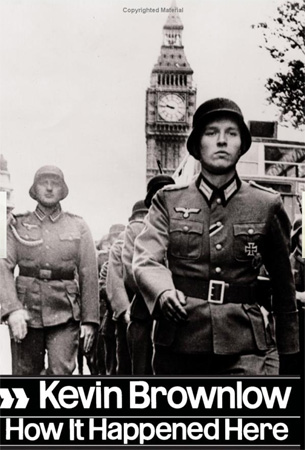 Book
cover Book
coverMark Lyndon: I wondered if we could talk a little about “It Happened Here” and “Winstanley”. “It Happened Here” was a fantasy... Kevin Brownlow: Yes ML: ...and yet I have never seen a film more realistic – that is the central paradox. It felt incredibly real and this possibly was what provoked people into thinking that you had given an open microphone to open fascists... KB: Yes. ML: ...a platform for them to rant from. (We will come to ranting later with "Winstanley".) You’d given them this opportunity, and they were very angry - you talked of a lady in Edinburgh who said “These are Britons who were doing this!” KB: The film started as just an adolescent way of showing off. I had no intention of making the film - what I wanted to do was to do a scene that would capture the imagination of producers and they would say here is the money to make the rest of it. What I shot was awful, but I needed somebody to tell me that, and I met this sixteen year old art student called Andrew Mollo, and he thought a film was something you saw in the Odeon on a big screen looking absolutely .....! and when he saw my stuff he was horrified; he had agreed to help me but when he saw what I had shot he was dismayed and he said “Everything is incorrect!”- I remember that was his line and I was of course furious. I was two years older than him and did not like having my work criticised. | More in 70mm reading: Kevin Brownlow Interview - Part 1 Projecting “Napoleon” – une pièce de resistance The Cinema Museum, London Robert A. Harris: Film Restoration on the eve of the Millennium A View from the Trenches Internet link: Photoplay Productions OSCAR speach for Kevin Brownlow Siment Eara about "Napoleon" Carl Davis Collection Napoleon Complex Wonders in the Dark BFI Interview with Kevin Brownlow Kevin Brownlow @ Wikipedia Sense of Cinema Able Gance Triptych |
“More realistic than normal”! | |
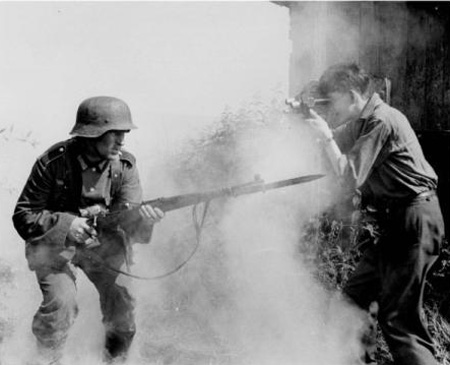 Kevin
Brownlow filming. Brownlow's image Kevin
Brownlow filming. Brownlow's imageI did not really know what he meant, but he had a collection – his father was Russian and his brothers specialised in French – one was French and the other had British military stuff, and Andrew had German – (I thought, uh oh, he is one of those !?! but luckily he was not!) but when he said if you are going to make a fictional film it has got to be more realistic than normal, to convince people. So he proved this by putting in front of the camera the real thing, the real uniforms, not just made up to look like the real thing – they were real uniforms, and vehicles, everything – and it was just like night and day; I was completely smitten with this Erich von Stroheim attitude and we used to go and see the latest films, and they were nearly all incredibly incorrect actually, especially in the fifties – the only one that was not was a masterpiece by a fellow called Stanley Kubrick called “Paths of Glory” – we were absolutely bowled over by that; it was quite staggering, and years later he helped us with short ends in order to finish the production. | |
Influenced by Orson Welles! | |
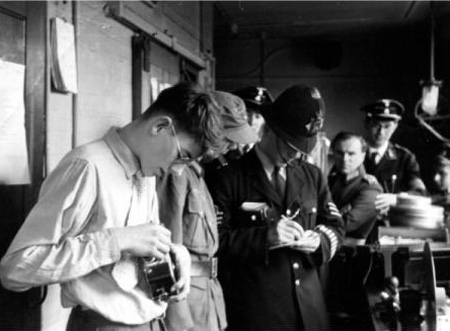 Kevin
Brownlow being questioned by the police. Brownlow's image Kevin
Brownlow being questioned by the police. Brownlow's imageBut also I wanted to be the second Orson Welles, and I was always looking at his work – ML: ...“a train set” he called it – being a director. KB: In "Citizen Kane" he did a fake newsreel, which was absolutely superb – and I just pinched that idea and did a fake newsreel: At this time in the late fifties, I was an editor, and my assistant was Peter Watkins. He was doing roughly the same sort of thing as us; but he was not so concerned with authenticity, but he was using this newsreel technique – I did not want to use it throughout a film, I wanted the film to be done in the classical way but when there was an excuse for it then I went flat out, and we did fake a complete newsreel. It was shown on BBC I remember, on Personal Cinema, and people objected strongly by saying “but this is nothing but Nazi propaganda!” ML: It was that convincing. KB: Yes. KB: The film took an incredibly long time because of costs, we had no money. ML: I believe it is in the Guinness Book of Records according to the website. KB: It’s true it is, but that is a bit unfair because a schedule has to be sequential and we had to stop after every day – every day was our first day – we then had to stop, save up, buy some more film; make another little move forward, then stop, save up, buy more film, anyway, Andrew had no money, he was an art student, I was working in documentaries; it was fairly chaotic. | |
Harry Saltzman |
|
|
KB: Towards the middle of production
Andrew became an assistant director to Harry Saltzman (Harry Saltzman’s
runner), and his first film was “Saturday Night and Sunday Morning”
and who should the producer be but Tony Richardson. Now Andrew was the
sort of person who would say “Aw no, I am not going to mention it to
him – I hate people who do that!!” But eventually he either did, or Tony Richardson got to hear about it, because it got a lot of publicity; and Richardson said if you can make that film for £3,000 I will back you. So of course we said yes and it went 100% over budget; but at least we made the whole thing for £7,000, and it was ninety six minutes; and it had a lot of quite complicated scenes in it, and it was supposed to be “here we are film industry – take us on board - we want to make films for you”; but nobody did! ML: You thought one thing would lead to another? KB: Yes, that was the idea, and we had all sorts of things lined up, but nobody wanted us. I think we made two basic errors – one is to make a film in which we could be perceived as being Nazis ourselves, and the other one was to be iconoclasts and make a picture which went around the world for very little – for less than the main titles of the James Bonds, as we used to say in those days. KB: That was a disappointment – although it was an incredible experience making it and it was many years before we realised we were never going to be employed as feature directors. We tried and tried, and tried, and we wanted to make this “Winstanley”: we realised that we had to do it ourselves. Another assistant of mine became the head of the BFI production board, that is Mamoun Hassan got us some money for that one. | |
“Winstanley” | |
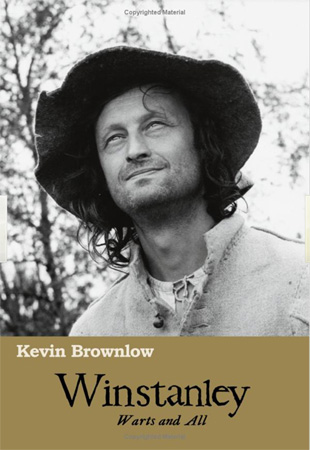 Book
cover Book
coverML: The Vivian Leigh Memorial Fund, and Eccles, who was minister of culture at the time (he had never used the London Underground and when his chauffeur-driven Rolls-Royce broke down they went into an underground station; he did not know what to do. “What do I do now – What am I supposed to do?” – “Well my lord you buy a thing called a ticket.” –“ A ticket?” –“ Yes my lord, and you go through the barrier” - Oh, oh, how very novel!!”) KB: Good God! ML: I went to one of his talks when he was a Minister in the Heath Government. He said he went to see a play called Alpha-Beta in the West End last night – “I could not make head nor tail of it” he said – “I like the sort of play that has a beginning, a middle, and an end!”. People were tittering a little. KB: Lindsay [Anderson] would love that! ML: Lord Eccles was mercilessly mocked by Private Eye - they called him “Smarty boots Eccles”. But this is ancient history – to get back to "Winstanley" and its budget: KB: Yes, that one cost £26,000 - things had gone up in the decades since we finished the other one (from 1965 to 1975). I was at the American Film Institute – Andrew and I were going to make one of the Bryan Forbes films for ABPC, but we got fired before a frame was shot over casting problems. So we realised that alas, I still regret it – that we did not become a team making films. ML: Philip French said on the BFI website that the major tragedy of the British cinema is that neither of you have directed a feature since then. KB: Very nice of him to say that! ML: But the central paradox of "Winstanley" - was it Rosenbaum who said it was quintessentially an English film but it had to cross the Channel to be received with open arms – particularly by the French? KB: Yes, the French! ML: Le Monde, and various other critics, praised it to the skies and it really made a tremendous impact, but here they did not understand it? Or what was wrong with them? | |
What the English expect from their Drama !? | |
|
KB: To be honest with you it was probably the
fact that the English expect extremely high standards of acting; the French
did not hear the delivery – this is my suspicion is – if we had had the
delivery that film critics are accustomed to, we might have stood a chance
but also it is a very peculiar film, I have to admit, but the notices were
really quite – well – I shall not forget those in a hurry but, again, it was
an amazing experience to do it. We had the seasons because we were able to do the shooting at weekends so that we had a free cast – the only person who was paid anything at all was Jerome Willis, the one professional, and he got the Equity minimum. He was tremendously helpful; he found us a location in which we could do practically all our interiors. Funnily enough, he had played Fairfax in the BBC version and won a prestigious television prize. (They do not tell you that the BBC destroyed every one of his plays including this one! And it was an experimental one in which the men on horseback were sitting on step ladders on TV.) Any way, Jerome Willis was in that and so he had a feeling for the film. | |
From the original works of "Winstanley" | |
|
KB: We were taking it from an historical
novel, and we went to the British Museum; we got out the original pamphlets
that Winstanley had published, which was a very eerie feeling because before
us was Marx, Engels, Lenin, incredible! – and there was a statue to
Winstanley in Gorky Park! We got these pamphlets out and we saw a different
story. It was not only were these pamphlets beautifully written but they
told what happened, and so having asked the author David Caute to write a
script for us, we now found ourselves wanting a different basis all
together. So the film veered over towards these marvellous documents, and
what you hear on the track spoken by Miles Halliwell who plays Winstanley is
exactly word for word what Winstanley wrote; one beautiful phrase comes to
mind - “a lawyer loves money like a poor man’s dog does his breakfast on
a cold morning”. ML: Beautiful stuff, but it portrays the seasons - and one of the French critics remarked on how these people were barely surviving but they kept their spirits up through singing? | |
The Diggers and the Ranters |
|
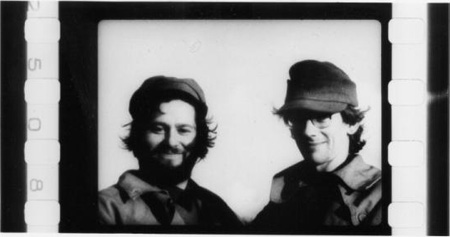 35mm
frame with Andrew Mollo and Kevin Brownlow. Brownlow's image 35mm
frame with Andrew Mollo and Kevin Brownlow. Brownlow's imageKB: Yes, they were a wonderful bunch, the people who played the diggers, but the funny thing was that when the ranters arrived there was exactly that standoff that you would have expected between the two groups - just as you see it in the film. And the fellow who played the leading ranter, Sid Rawle, was a prominent figure in the New Age Movement, he started the New Age Travellers scene; he started the Windsor Pop Festival, the Reading Pop Festival – he was extraordinary – and he regarded himself as a ranter but he called himself a digger – the New Diggers, which is how I came in contact with them. | |
The Casting Train? | |
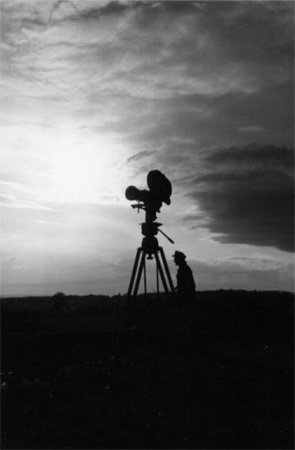 Kevin
Brownlow filming. Brownlow's image Kevin
Brownlow filming. Brownlow's imageKB: We used to do the casting by going on the underground – talking of Eccles – and I made the perfect choice for the part of Parson Platt – chased him off the train – down the corridor, confronted him, and he said “I would love to help you but I am Chaplain General to the Queen!” KB: But I think we did pretty well with the Parson Platt; Andrew got ‘Captain Gladman’ off an underground train; he turned out to be an Australian newsreel cameraman. ML: Yes, the Australian fellow, the accent maybe jarred a bit? KB: Oh, does that come through? ML: It did. I bought a Blu-ray, and played it back on a very good machine; it looked absolutely stunning – for some reason 16mm looks particularly good on Blu-ray because it has still got that grain structure and it comes across marvellously. KB: A bloke stopped me in the NFT and said “I have just bought your film on Blu-ray and wish I had not – all the atmosphere goes!” KB: I have not dared look at it. I was shocked by the other one – the DVD – because the very first shot in the entire picture was incorrectly graded, and I had been there grading the thing all the way through. The camera man had been there grading the thing all the way through too, and suddenly it is the wrong grading, and I could not bear to see the film after that! ML: Well, hopefully they have improved it, perhaps that is more of a hope.... | |
Other insights – socialism ? | |
|
Other insights – socialism KB: What else about "Winstanley" – his ideas were extraordinary for the period. It is the first time that socialism – Christian communism - is what it really was but we do not say that too often as it is a word that gets people upset; but he was a communist in the true sense, and communism actually has not been tried, it is always turned into red fascism. ML: Invariably, apart from the Kibbutz movement in Israel to begin with. KB: Yes, I heard about that. KB: It did not work in this instance either but it was fascinating to see how they thought, what they thought what they wrote – marvellous. Ernie Vincze – Hungarian, had escaped from the Hungarian uprising as a 14 year old. He had been involved in that – he was the cameraman, he had a wonderful visual sense once we got over the first hurdles of trying to get that dryer look and the labs not understanding us. KB: I have written a book on that as well actually - “Winstanley – Warts and All”. | |
Andrew de Toth, et al, views on Cinerama! | |
|
André de Toth, et al, views on Cinerama ML: One final question if I may – I had a run in with André de Toth KB: Oh yes? ML: ...back in the nineties about Cinerama, and he regarded it with complete contempt. He kept saying “Your Cinerama is – so and so .**.!” – and a few years later I had a discussion with one of your near neighbours, Jonathan Miller, and he loftily pooh-poohed it, and dismissed it airily. I was wondering, what is it about Cinerama that frightens one-eyed Hungarian film directors and intellectuals so much? KB: Oh, André de Toth did the first 3-D film and could not see the 3-D – because he had one eye and there is something very ironic him objecting to Cinerama. But it is the circus comes to town – it is that side of cinema, travelogues, James Fitzpatrick, and all that sort of thing; except they had Merian [C.] Cooper. We made a film on this - did you ever see it ? ML: No alas – I have some catching up to. | |
Dave Strohmaier – Cinema Adventure | |
|
KB: It is called “I am King Kong”,
and it is the career of Merian Cooper; it has a lot about Cinerama at
the end and there is a fellow called
Dave Strohmaier
- who has made a marvellous documentary called "Cinerama Adventure". ML: Oh yes, I have got that. KB: And that has got Gance in it, hasn’t it? at some point. That is a magnificent documentary. ML: Dave - he does a wonderful impression of John Wayne. KB: Does he really? I will look at that again. ML: A couple of years ago we were in the bar of the Midland Hotel in Bradford at the end of the day’s festivities and we got into doing impressions and he got up and he did the walk and it was perfect. The beauty of the Bradford Film Festival Wide Screen Weekend is the après Cinerama in the bar, where you have people in the business and we have many amusing stories exchanged, impressions and all the rest. And there we must leave it, and thank you very much for your time. KB: Not at all ML: Cut! | |
| Kevin Brownlow Interview - Part 1 | |
| Go: back - top - back issues - news index Updated 22-01-25 |
